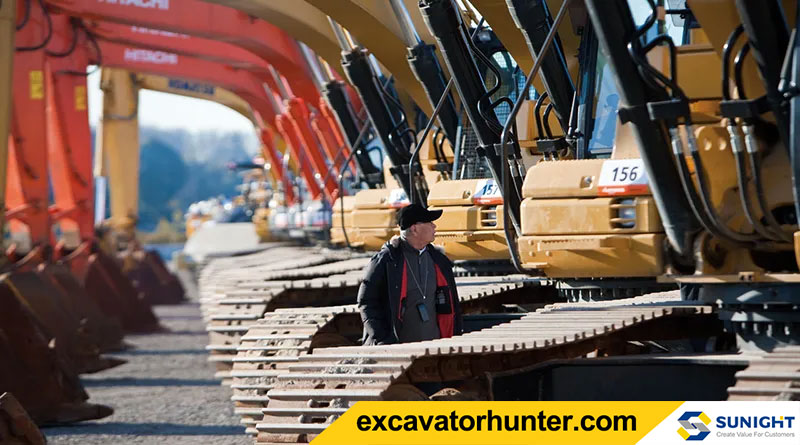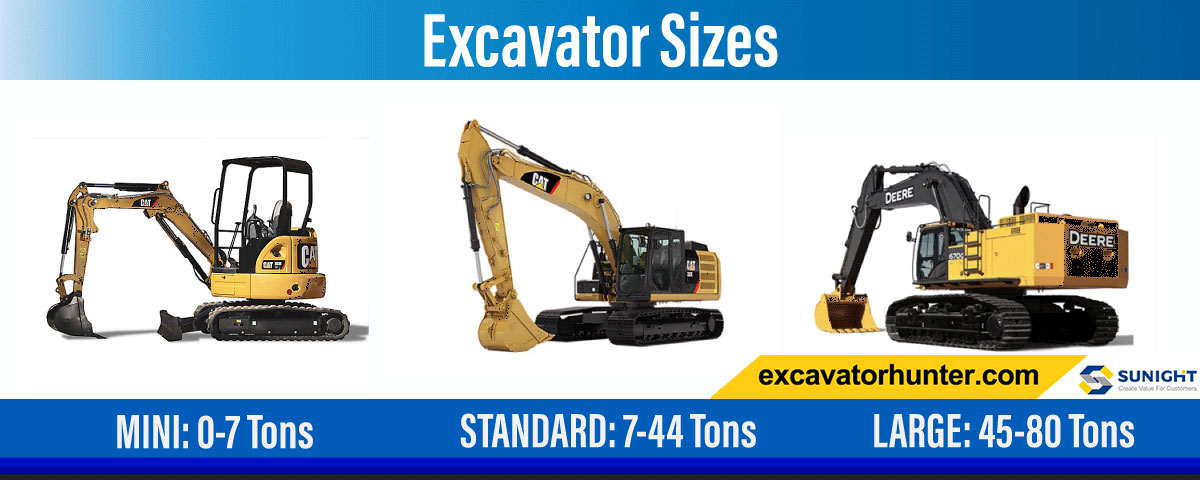When buying used excavators, there are several things to consider to ensure you get a machine that meets your needs and is in good condition. Here are some of the main things to look for:

- Condition: The overall condition of the excavator is important. Check for any signs of wear and tear, damage, or rust. Inspect the engine, hydraulic systems, tracks, and bucket to make sure they are in good working condition.
- Hours of operation: The number of hours the excavator has been used can be an indicator of how much wear and tear it has undergone. However, it's important to note that a low number of hours doesn't necessarily mean the machine is in better condition.
- Service history: Ask for the service history of the excavator to see how well it has been maintained. Regular servicing and maintenance can extend the lifespan of the machine and prevent breakdowns.
- Price: Compare the price of the used excavator to similar machines on the market to make sure you are getting a fair price. However, don't solely focus on the price as the cheapest machine may not be the best choice in the long run.
- Purpose: Consider the purpose for which you are buying the excavator. Different types of excavators are designed for specific tasks, such as digging, demolition, or forestry work. Make sure the machine you choose is appropriate for the job you need it to do.
- Seller: When buying a used excavator, it's important to consider the reputation of the seller. Look for a reputable seller with a history of selling high-quality machines and providing good customer service.
Tips for Buying an Excavator: 6 Things to Check Before You Purchase
Buying an excavator is a major investment, and it's important to make sure you choose the right machine for your needs. Here are six things you should check before you make your purchase:

- Size and Type: Excavators come in different sizes and types. Make sure you choose the right size and type of excavator for your needs. Consider the size of the job site, the depth and width of the trenches or holes you need to dig, and the amount of material you will be moving.
- Condition: Check the condition of the excavator thoroughly. Look for any signs of damage, such as cracks or leaks in the hydraulic system, worn out tracks or tires, and any other wear and tear that may indicate poor maintenance or neglect.
- Maintenance Record: It's important to check the maintenance record of the excavator you're considering purchasing. This will give you an idea of the machine's history and how well it has been maintained. A well-maintained machine is less likely to break down or require costly repairs.
- Price: Excavators can be expensive, so it's important to do your research and compare prices before making a purchase. Look for a machine that offers good value for money and is within your budget.
- Warranty: A warranty can give you peace of mind and protect you against any unexpected issues. Check to see if the excavator you're considering comes with a warranty, and if so, what it covers and for how long.
- Dealer or Seller Reputation: Look for a reputable dealer or seller when purchasing an excavator. Check online reviews and ask for referrals from other contractors or construction companies. A reputable dealer will offer good customer service and support, and will be more likely to sell you a quality machine.
USED EXCAVATOR INSPECTION: EVERYTHING YOU NEED TO KNOW
If you are considering purchasing a used excavator, it's important to inspect the machine thoroughly to ensure that it's in good condition and will meet your needs. Here's everything you need to know about inspecting a used excavator:

- Check the machine's appearance: Inspect the machine's overall appearance, including the body, paint job, and decals. Look for any signs of rust, corrosion, or damage, which could indicate that the machine was not well-maintained.
- Examine the engine: Check the engine for any signs of leaks or damage, such as oil leaks or cracked hoses. Make sure that the engine starts up and runs smoothly.
- Inspect the hydraulic system: Check the hydraulic system for any signs of leaks, damage, or wear and tear. Make sure that the machine's hydraulic functions, such as the bucket or boom, operate smoothly and without hesitation.
- Check the tracks: Inspect the tracks for any signs of wear and tear, such as cracks or missing pieces. Make sure that the tracks are properly aligned and have enough tension to ensure smooth operation.
- Inspect the cab: Check the cab for any signs of damage, such as broken windows or missing parts. Make sure that the cab is clean, and that all of the machine's controls are in good working order.
- Review maintenance records: Ask the seller for the machine's maintenance records. Look for evidence of regular maintenance, such as oil changes, filter replacements, and other routine maintenance tasks.
- Test drive the machine: If possible, take the machine for a test drive to ensure that it operates smoothly and meets your needs. Pay attention to how the machine handles, its maneuverability, and its overall performance.
- Get a professional inspection: Finally, consider hiring a professional to inspect the machine. A professional inspection can identify any hidden problems that you might have missed during your own inspection.
By following these tips and conducting a thorough inspection of the machine, you can ensure that you purchase a high-quality used excavator that will meet your needs and perform well for years to come.

 CHATING
CHATING CALL
CALL USED
USED CASES
CASES